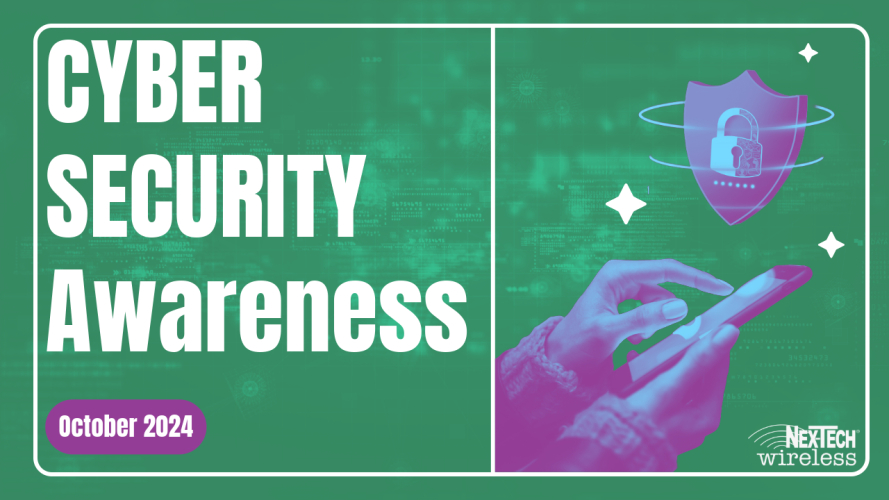We touched on Cyber Security Awareness Month last year and why it is important to be careful what you do with your devices. At NTW, we wo our best to keep your information safe and secure, but there is only so much we can do as your wireless carrier. While the advancement of technology in the last year has had its benefits, there are always those out there who will use these to take advantage of others. Scammers have gotten smart with their attacks and threats to people personal information.
Like every other carrier, we continue to see scam texts and calls come through that can put your devices and personal info at risk. While NTW has increased its security to block these messages from being delivered, scammers are equally aggressive in changing their tactics to avoid being flagged. It is impossible for us to notify our customers of every potential threat that comes across our network, but general precautions can keep customers safe. Scammers are getting more sophisticated at making scam text messages look authentic and often use identity masking technology to change the name displayed as the caller ID. This is known as number spoofing. That said, if you’re wondering how to tell if a message is a scam, there are a few signs to watch out for:
- Unexpected contact. Think about how an organization usually contacts you. If it isn’t via a text message, contact them directly to check if it’s legitimate. Remember, genuine organizations don’t contact you out of the blue, asking you to disclose personal or financial details via a text message.
- Spelling and grammatical errors. If a message doesn’t look professional, that’s a red flag that it’s probably a scam. Legitimate organizations rarely make glaring spelling or grammatical errors in customer communications.
- Is the message relevant to you? For example, if it informs you about a parcel delivery, did you order or were you expecting anything? If it informs you about a prize, did you enter a competition? If it’s about a gift card, is it from somewhere you have previously shopped?
To avoid getting scammed through text message, you should….
- Don’t respond. Avoid responding to any text messages from unknown or suspicious numbers, even if they ask you to "text STOP". Responding can let scammers know your number is active and may lead to more spam in the future.
- Don't click links. Avoid clicking on any links in text messages, especially if they are short or abbreviated URLs.
- Be wary of social engineering. Be aware of red flags like urgent messages, "get rich quick" schemes, promises of free gifts, or job offers.
- Verify the source. If you receive a text that appears to be from a company or government agency, you can verify the authenticity by contacting them separately using their official website or phone number.
- Keep your device updated. Keep your phone's operating system and security apps up to date to protect against malware.
With the advancement and widespread implementation of AI in the last year, it is no surprise that some are using it to aid in their scams. It is now commonplace to see videos of celebrities and high-profile figures offering free money or other lucrative offers to people if they visit a certain website and use a code or something along those lines. However, these are created using deepfakes and AI generated replications of the person’s voice to make them seem more legitimate. Now, more than ever, it is important to scrutinize everything you see online and double check whether a website or link is safe. In cases where you are not sure, the best advice would be to just not trust it. In other words, it is better to be safe than sorry. Check out this interactive NYT deep dive into these types of scams and how they work.
Lastly, as we shared last year, here are some helpful tips from the United States Cyber Security & Infrastructure Security Agency that can keep your data and information safe:
- Make sure you are using strong passwords
- Turn on Multi-Factor authentication
- Learn to recognize and report malicious attacks such as phishing
- Keep your device software updated
https://www.cisa.gov/cybersecurity-awareness-month
If you have any other questions or concerns about your cyber security, you can reach out to our Customer Care team by calling or texting 785-621-2600, sending an email to customercare@ntwls.com, or via online chat at www.nex-techwireless.com.



